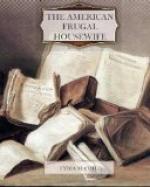About the last of May, or the first of June, the little millers, which lay moth-eggs begin to appear. Therefore brush all your woollens, and pack them away in a dark place covered with linen. Pepper, red-cedar chips, tobacco,—indeed, almost any strong spicy smell,—is good to keep moths out of your chests and drawers. But nothing is so good as camphor. Sprinkle your woollens with camphorated spirit, and scatter pieces of camphor-gum among them, and you will never be troubled with moths. Some people buy camphor-wood trunks, for this purpose; but they are very expensive, and the gum answers just as well.
The first young leaves of the common currant-bush, gathered as soon as they put out, and dried on tin, can hardly be distinguished from green tea.
Cream of tartar, rubbed upon soiled white kid gloves, cleanses them very much.
Bottles that have been used for rose-water, should be used for nothing else; if scalded ever so much, they will kill the spirit of what is put in them.
If you have a greater quantity of cheeses in the house than is likely to be soon used, cover them carefully with paper, fastened on with flour paste, so as to exclude the air. In this way they may be kept free from insects for years. They should be kept in a dry, cool place.
Pulverized alum possesses the property of purifying water. A large spoonful stirred into a hogshead of water will so purify it, that in a few hours the dirt will all sink to the bottom, and it will be as fresh and clear as spring water. Four gallons may be purified by a tea-spoonful.
Save vials and bottles. Apothecaries and grocers will give something for them. If the bottles are of good thick glass, they will always be useful for bottling cider or beer; but if they are thin French glass, like claret bottles, they will not answer.
Woollens should be washed in very hot suds, and not rinsed. Lukewarm water shrinks them.
On the contrary, silk, or anything that has silk in it, should be washed in water almost cold. Hot water turns it yellow. It may be washed in suds made of nice white soap; but no soap should be put upon it. Likewise avoid the use of hot irons in smoothing silk. Either rub the articles dry with a soft cloth, or put them between two towels, and press them with weights.
Do not let knives be dropped into hot dish-water. It is a good plan to have a large tin pot to wash them in, just high enough to wash the blades, without wetting the handles. Keep your castors covered with blotting-paper and green flannel. Keep your salt-spoons out of the salt, and clean them often.
Do not wrap knives and forks in woollens. Wrap them in good, strong paper. Steel is injured by lying in woollens.




